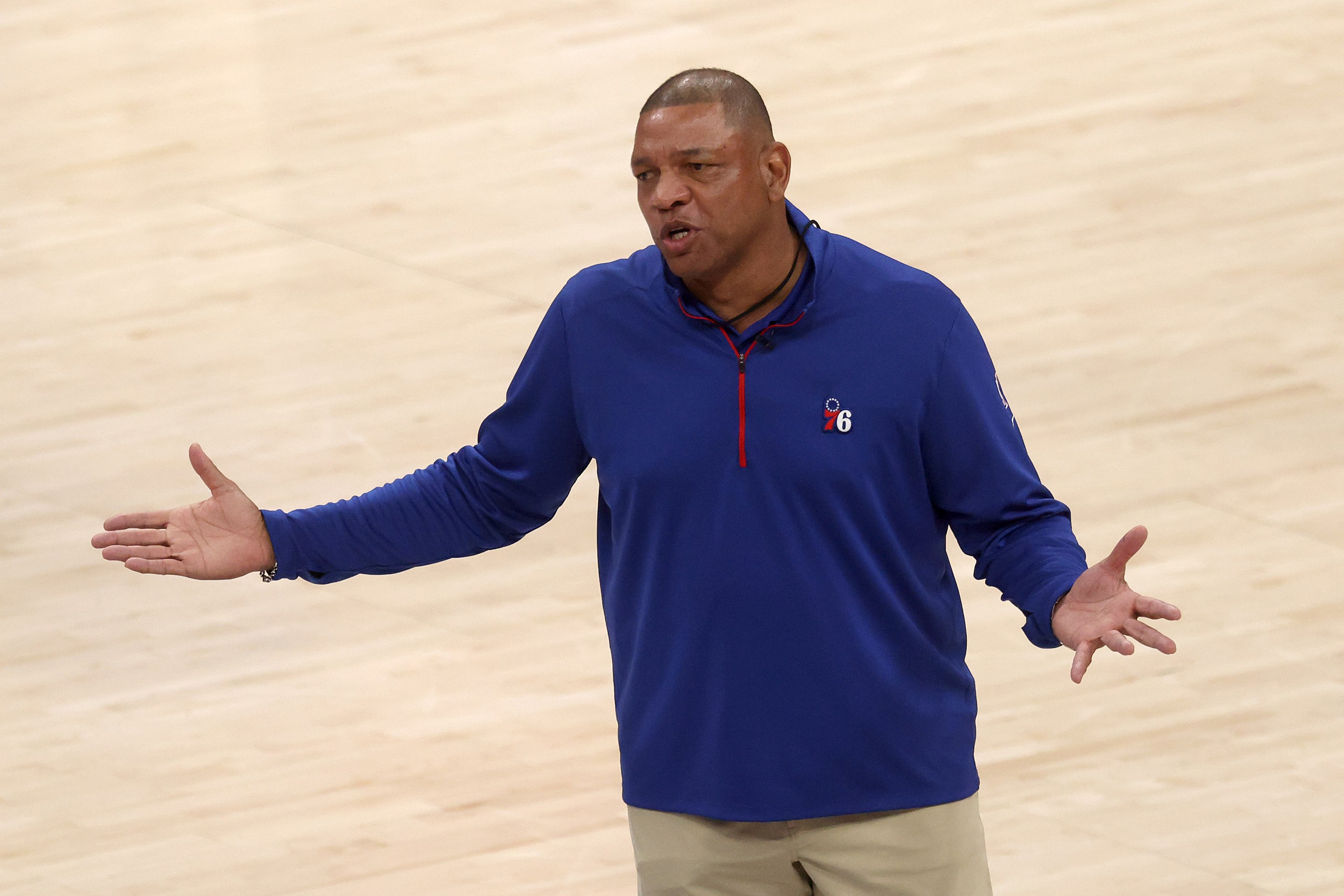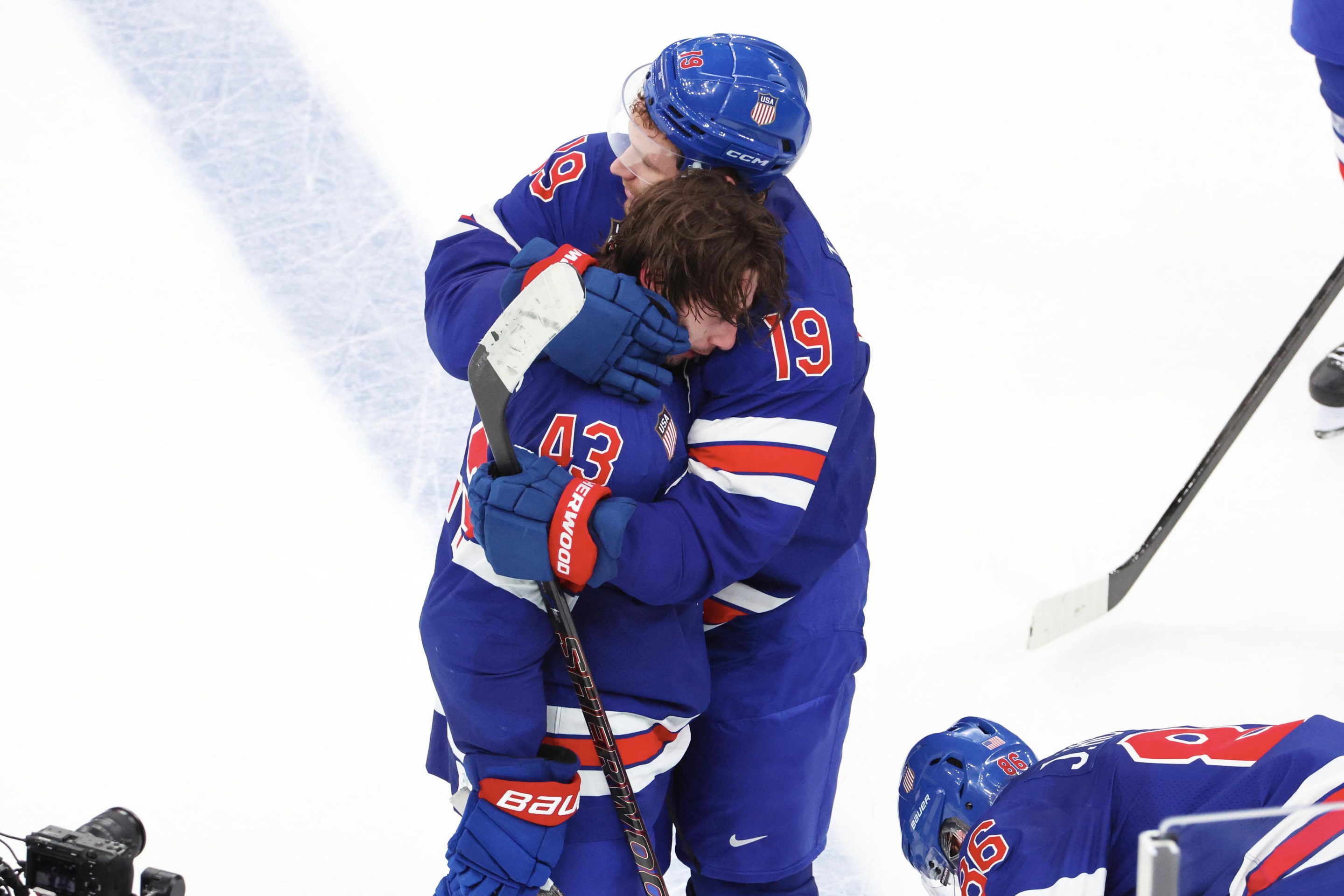I know the answer to this question, at least in theory. It is the job of an NBA head coach to position his team to win basketball games. That mandate shares or swaps priority with long-term developmental concerns very often from one moment and one game to the next, but usually not during a second-round playoff series. In a second-round playoff series, the job narrows down to winning basketball games. Rotations get pared to the bare minimum; stars get stretched to their limits and beyond; all-world centers with extraordinarily destructible skeletons play 41 minutes on knees bursting with slimy crabmeat. A head coach who delegates hell-or-high-water duties to his explosively injurable and infinitely valuable center is doing that job, with all its risks. A head coach who does that while also delivering major minutes to a head-case who quite evidently would rather be eaten alive by a family of possums than bear even the most fleeting situational scoring burden, in order to protect the latter from humiliation, is fucking up.
Then again, it's incredibly rare for the management of one star player's development to run so starkly opposite a team's immediate ambitions. Sometimes a player gets spoon-fed some unearned possessions in order to juice up his effort level, but at least those possessions have a snowflake's chance in hell of producing a positive outcome. Even Russell Westbrook partially redeemed Scott Brooks's determination to prop him up as an offensive centerpiece in Washington, even if in the end the lackluster results cost Brooks his job. I don't know if the NBA has ever seen as comprehensive a meltdown as the one Ben Simmons produced over the final four games of Philadelphia's season. It's worth standing back and taking in the whole grisly scene: Simmons played 34 total minutes across the fourth quarters of games four through seven; in those minutes he produced zero total shots; it took him 12 free-throw attempts to scratch together six total points; he added just four rebounds and three assists; the Sixers were outscored by 17 points in aggregate during those minutes. The numbers are so breathtakingly bad that in retrospect Rivers's refusal to exile Simmons to, I dunno, the Marshall Islands seems like an act of deliberate sabotage.
On the other hand, the magnitude of Simmons's disappearing act was so mind-boggling vast, and the the abjectness of it so jaw-droppingly unlikely, that in a way it circles all the way back around and sort of argues for Doc's decision to let him play through it. In the most basic sense, it just did not seem possible that someone who has been as good as Simmons has been could so suddenly and decisively be this bad. Simmons has been his team's primary playmaker and ball-handler since the moment of his arrival in Philadelphia. From his first minutes with the team he's made it clear that he considers himself a point guard, and at no point between then and the moment Sunday night when Doc Rivers said explicitly that he's not convinced Simmons can be a championship-caliber point guard has the organization in any way discouraged that positional preference or hedged against its potential failure. What's more, it works! The Sixers won 68 percent of their games this season; Simmons finished the regular season with a pristine 6.3 efficiency differential, per Cleaning the Glass; the team was 5.4 points per game better by net rating with him on the floor than off; they won the top seed in the Eastern Conference; they creamed their first-round opponent in the playoffs; and everything that happened in this horrifying second-round flame-out is shaded by a knee injury suffered by Joel Embiid more than a week before the series even started.
In light of all that, which course of action seems like the more deranged gamble: Continuing to give opportunities to your three-time All-Star lead ball-handler and primary playmaker with your entire season and possibly your entire championship window on the line? Or, alternatively, not doing that? Just one round earlier Simmons put up a clean and efficient triple-double in an elimination game and led the Sixers past a lower seed with Embiid all the way out of the rotation. Now Rivers is supposed to just hand over his duties to Tyrese Maxey? As obvious as it is today that the answer was "yes," that is still a fucking incredible turn of events, and doing the right thing in these circumstances would require both a clarity of purpose that borders on the superhuman and an absolutely unshakeable faith in the orientation of the organization's priorities. What if you bench Simmons for Maxey and still lose? What if you alienate one of your team's prized jewels, a player whose stardom validates and redeems for a vocal set of diehard fanatics a whole franchise-altering multi-year tanking project, and still lose?
Consider, while we're here, how hilarious and insane it is that, heading into Simmons's sixth year as a professional, he and his coach are still talking about how he will need to devote his offseason to developing the primary, defining skill of the sport of basketball. Simmons said after the game that he "wasn't there" offensively, and that that's something he "will need to work on" over the summer. Rivers said he and Simmons will need to "get in the gym" and "put a lot of work in," which sounds more or less like normal end-of-the-year chatter until you realize that what they're talking about is throwing the ball into the basket at even a remedial level, and that the person they're trying to teach is a 6-foot-10 athletic marvel who's already been handed the keys to the offense. In the merciless light of the aftermath it seems so sickeningly obvious that Simmons is as much as he will ever be, which makes it all the more heartbreaking to think of him and his coach at the chalkboard in August, discussing in the most rudimentary possible terms which hand should go behind the ball on a basic jump shot.
This is supposed to be a title team, and Simmons is supposed to be one of its heroes! Six years in, with a vastly more stable job than the coach nominally in charge of his minutes, Simmons needs dedicated classroom time in order to be consistently not-catastrophically-unplayable in a playoff series against the fifth-seed Atlanta Hawks. It seems plainly deranged to say to a coach here's a championship-ready team, now all you have to do is decide whether we can give any playing time to one of its three core players, who by the way hates putting the ball in the basket and quite possibly cannot manage it from any spot on the floor. Please consider teaching him the fundamental action of the sport, when you can.
Ben Simmons did not just pass this up... pic.twitter.com/4JyM7ZHNkJ
— Bleacher Report (@BleacherReport) June 21, 2021
So, yes, Doc Rivers fucked up. Of course he did! Every night for more than half of a playoff series one of his key players swapped jerseys and started playing for the other guys, and every night he kept cramming that guy into his lineups, and a crushing seven-game exit was the result. But this was a fuck-up five years in the making. Simmons and Embiid were each granted God status the moment they arrived in Philadelphia, both for their power to redeem a cosmic-brained general manager who'd become a powerful martyr figure among fans and, more to the point, for giving the team hope for a future utterly unlike its recent run of historic shittiness. Simmons was handed lead guard playmaking duties and the position of his choice despite some glaring, potentially game-breaking inadequacies in his game. In order to keep him secure and happy, opportunities to fortify the roster with ball-handlers who are both better suited for traditional playmaking responsibilities and tested against playoff-caliber defenses were punted or scrapped. The problem of an awkward fit with the team's primary star was sort of kicked down the road, despite that road leading inexorably to situations where that awkwardness would be increasingly problematic. A sequence of choices made by pressured executives and their predecessors, and then reinforced by his own habit of coaching to his players' preferences, winnowed Doc's available options all the way down to an impossible binary, at the worst possible moment: Use Ben Simmons, or use anyone but Ben Simmons.
A less neurotic organization might've tuned early-career Simmons for something approximating the Draymond Green job, setting screens and shoveling sprint-speed handoffs with his team's real lead guards, slipping into acres of space on the short-roll and charging into unguardable 4-on-3 attacks below the free-throw line, shedding diminutive crossmatched defenders on opportunistic post-ups. That version of Simmons also probably wouldn't shoot much, but he would never much need to shoot in a system that viewed him as a turbocharged role-player and not an alpha ball-handler. It's not all that clear whether that job would've suited him all that much better in playoff lineups built around Embiid, but that's a role that can be much more easily deemphasized if a given opponent or scenario makes it untenable. At any rate, that opportunity is now entirely theoretical and long past. Instead the Sixers tethered their identity and championship aspirations to this particular vessel, with all its unfortified vulnerabilities and maddening habits of self-destruction. It's the coach's job to steer the ship, but in this case it seems like Rivers had very little choice but to go down with it.






